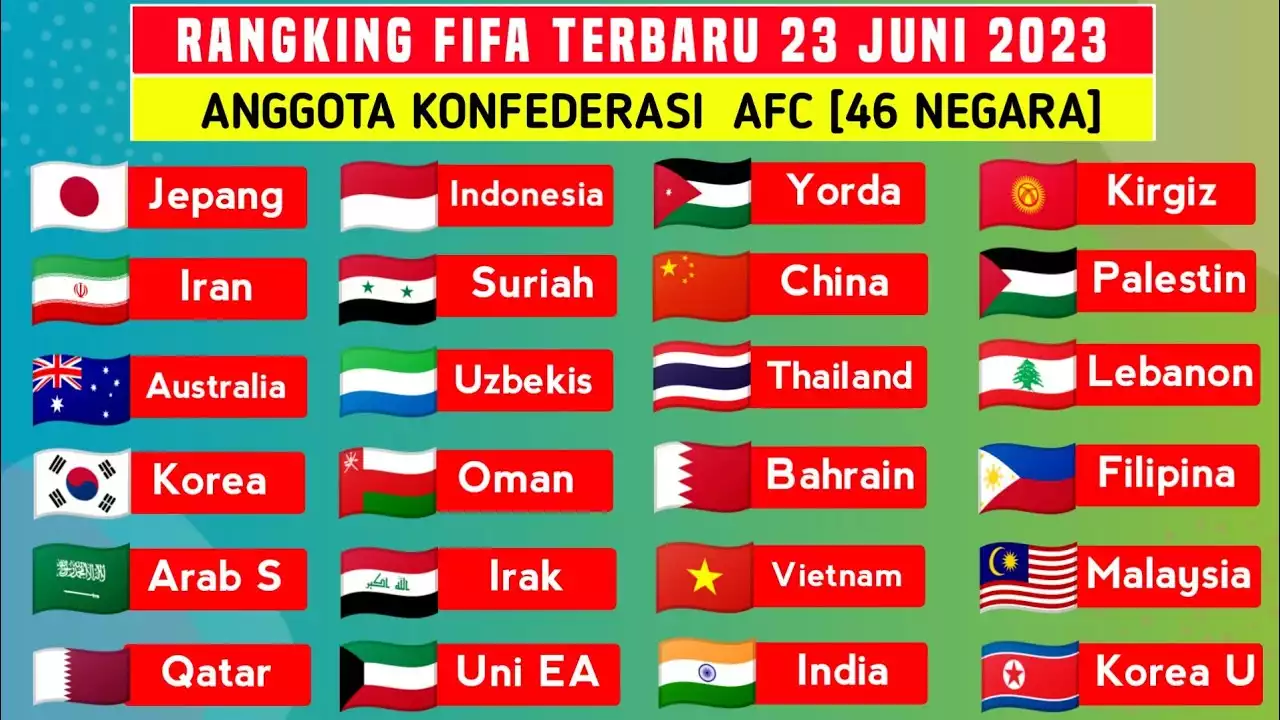The significance of qualification moments
Qualification moments in the AFC Asian Cup are crucial as they determine which teams get the chance to participate in the tournament. These moments often involve intense matches, where teams battle it out to secure their spot in the prestigious competition. However, some qualification moments stand out due to their controversial nature, leaving a lasting impact on the tournament.
Controversial qualification moments not only generate heated discussions among fans and pundits but also have consequences for the teams involved. These moments can lead to questions about fairness, integrity, and the overall credibility of the tournament. They also highlight the importance of clear rules and regulations to ensure a fair and transparent qualification process.
Indonesia's Suspension (2015)
One of the most controversial qualification moments in the history of the AFC Asian Cup occurred in 2015 when Indonesia was suspended from the tournament. The controversy arose due to governance issues within the Football Association of Indonesia, which led to FIFA's intervention. The suspension meant that Indonesia's matches were considered walkovers, resulting in their disqualification from the tournament.
The decision sparked outrage among Indonesian football fans and raised questions about the impact of governance issues on the sport. It also highlighted the need for stronger regulations and oversight to ensure the smooth running of national football associations. The suspension had significant consequences for Indonesian football, as the team missed out on the opportunity to compete in the AFC Asian Cup and showcase their talent on an international stage.
Impact of Indonesia's Suspensionon the tournament
The suspension of Indonesia had a profound impact on the 2015 AFC Asian Cup. With one less team in the competition, the tournament's dynamics changed, and the remaining teams had to adjust their strategies accordingly. The absence of Indonesia also meant that fans were deprived of the opportunity to witness the skills and abilities of Indonesian players, who would have undoubtedly added excitement to the tournament.
The controversy surrounding Indonesia's suspension also raised important discussions about the role of governance in football and the need for stricter regulations. It served as a reminder that the integrity of the sport relies not only on the skills of the players but also on the transparency and accountability of football associations.
Eligibility Controversy (2019)
In the 2019 AFC Asian Cup qualification, an eligibility controversy emerged that caused a stir within the football community. The controversy involved the eligibility of certain players representing different national teams. Questions were raised about whether these players met the necessary criteria to play for their respective countries.
The eligibility controversy led to debates about the integrity of the qualification process and the enforcement of eligibility rules. It also highlighted the importance of fair play and ensuring that teams participating in the AFC Asian Cup are composed of eligible players. The controversy had implications not only for the teams involved but also for the reputation of the tournament itself.
Analysis and reactions to the eligibilty controversy
The eligibility controversy in the 2019 AFC Asian Cup qualification sparked a range of reactions from fans, players, and football pundits. Some argued that stricter measures should be in place to prevent such controversies from arising, while others believed that the existing rules and regulations were sufficient. The controversy also prompted discussions about the responsibilities of national football associations and their role in verifying the eligibility of players.
The AFC Asian Cup's response to the eligibility controversy was crucial in addressing the concerns raised. The tournament organizers took the opportunity to review and reinforce the eligibility criteria, ensuring that future qualification processes would be more transparent and free from controversy. This incident served as a reminder of the importance of maintaining the integrity of the sport and upholding fair play principles.
Australia's Move to the AFC (2006)
Another highly controversial qualification moment in the history of the AFC Asian Cup occurred in 2006 when Australia made the move from the Oceania Football Confederation (OFC) to the Asian Football Confederation (AFC). This move sparked debates among football fans and raised questions about the fairness of the qualification process.
Australia's move to the AFC meant that they would have to compete against Asian teams to secure their spot in the AFC Asian Cup. This decision had significant consequences for both Australian and Asian football. For Australia, it meant a higher level of competition and the opportunity to test their skills against some of the best teams in Asia. For Asian teams, it meant facing a new and formidable opponent in the qualification process.
Consequences of the move of Australia to the AFC
The move of Australia to the AFC had far-reaching consequences for both Australian and Asian football. On one hand, it allowed Australia to gain exposure to a higher level of competition and improve their skills by competing against strong Asian teams. On the other hand, it presented a challenge for Asian teams, as they now had to compete against a team with a different playing style and a higher level of experience.
The move also had implications for the AFC Asian Cup itself. With the inclusion of Australia, the tournament gained a more global appeal and attracted a larger audience. The increased competition and the presence of a highly competitive Australian team added excitement to the qualification process and raised the overall standard of the tournament.
Comparison of the three controversial qualification moments
When comparing the three controversial qualification moments in the AFC Asian Cup, it becomes evident that each incident had its unique impact on the tournament. Indonesia's suspension highlighted the importance of governance and regulation, while the eligibility controversy emphasized the need for transparency and fair play. Australia's move to the AFC brought a new level of competition and global appeal to the tournament.
These controversial moments serve as reminders of the complexities and challenges involved in the qualification process. They also highlight the passion and drama that surround the AFC Asian Cup. As football fans, we can learn from these controversies and work towards ensuring a fair and transparent qualification process that upholds the integrity of the sport.
The AFC Asian Cup has seen its fair share of controversial qualification moments that have left a lasting impact on the tournament and the teams involved. From Indonesia's suspension to eligibility controversies and Australia's move to the AFC, these incidents have sparked debates, raised questions, and shaped the history of Asian football. The significance of these controversial moments goes beyond the tournament itself, reminding us of the importance of governance, fair play, and transparency in the sport we love.









